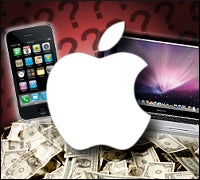 |
Intel set the stage for second-quarter earnings last week with outstanding numbers that handily beat estimates — putting a bit of a burden on the rest of the tech sector: If Intel is seeing signs of life, you’d better be seeing them, too.
Apple, though, is a slightly different animal, at times in sync with the rest of the sector, and at others, defying many of the trends in the market. Now, with its earnings due on Tuesday after the close of trading, it remains to be seen whether Apple (NASDAQ: AAPL) will second Intel’s good news.
Projections are fairly wide, which has been common in this economic uncertainty. The Thomson Financial consensus puts revenue at $8.18 billion. J.P. Morgan has been on the high side of things, predicting $8.49 billion in revenue with earnings per share of $1.23.
The lowest analyst estimation is from Piper Jaffray, which is predicting $8 billion in revenue. Only Apple’s estimates are lower, at $7.9 billion. But Apple has a long history of underestimating its numbers only to blow them away.
By the numbers
Here’s what we do know: Apple has been most active with its MacBook line, cutting prices twice and refreshing the line twice, including in June.
In a research note, Piper Jaffray analyst Gene Munster noted a report from market researcher NPD Direct that domestic Mac sales, which account for roughly 40 percent of Apple’s total Mac shipments, rose 16 percent in June after lower-priced MacBook Pros hit the market.
This led Munster to project that Mac sales for the quarter that ended in June could run as high as 2.6 million units, a record June quarter for Apple. NPD also projected that iPod sales would drop about 13 percent year-over-year to 9.6 million units, which is comparable to the 10 percent decline Munster previously predicted.
J.P. Morgan analyst Mark Moskowitz predicts Apple’s Q2 Mac sales will top 2.5 million units worldwide, a 17 percent rise from the 2.13 million sold in the second quarter of 2008.
Apple’s Mac sales have gone up and down this year. However, Gartner’s recent numbers painted a less optimistic, although incomplete picture. Gartner said Apple’s second quarter sales were up only 2.8 percent in the U.S. Gartner’s numbers may also reflect the fact that it doesn’t get stats from Apple’s own retail stores — just major retailers.
Ezra Gottheil, an analyst with Technology Business Research (TBR), thinks the economy might still be weighing on Apple.
“Units have been close to flat last few quarters and [average selling prices] have declined much like every other PC vendors,” he told InternetNews.com. “In Apple’s case, that’s much more a consequence of a change in the product mix of what people are buying, although they did lower a few prices.”
“Are they gaining share like before? Not really. If you divvy up the Mac market, you’ve got the committed Apple buyers who are certainly not going to switch, and you’ve got the Windows transitioners, many of whom have decided this isn’t the time to buy a machine that’s more expensive,” he added.
iPhone and iPod
The iPhone is a harder business to measure because of the way Apple accounts for revenue, which it realizes over the two year lifespan of the device.
“They would have a billion dollars coming in this quarter even if they sold zero units, thanks to this accounting method,” Gottheil said.
As a result, it’s hard to measure the iPhone 3GS‘s impact. J.P. Morgan puts Q2 iPhone sales at 4.34 million units, up from 3.88 million last year.
Then there’s the iPod. That market is saturated but it is shifting to the iPod Touch, the new design that’s basically an iPhone without the phone component. Gottheil said in the last report he saw from Apple, the Touch sold two-thirds as many units as iPhones, and Apple has a back to school bundle where MacBook buyers get a free Touch with their laptop.
It’s also eating into the market previously held by Nintendo’s DS Lite and Sony’s PSP.
[cob:Special_Report]”It’s a fabulous gaming platform and the kids love it,” Gottheil said. “It has some practical apps, but what the kids buy them for is gaming and Internet access and social networking and all that.”
He expects the iPod lineup to be refreshed later this year, something Apple usually does around the fall.
In the meantime, the company’s App Store will provide some revenues but not much profit, much like iTunes, he said. Many of the apps on the service are inexpensive, while the vast majority of them are free altogether — but Apple makes it up in volume.
At this point, Gottheil thinks that Apple will continue to do well if the economy can avoid any more crises like the one that hit in the fourth quarter of 2008.
“My general sense [of the economy] is it will be dismal for a long time but if we’ve seen a bottom, then they’re fine,” Gottheil said. “I think what will hurt them badly is if there is another panic, because then, people will be careful with discretionary spending.”
The big question mark for this year is the oft-rumored Apple tablet PC/device. Gottheil said he’s a believer.
“I think there’s something there,” he said. “I think there’s a device, it has the capabilities of a iPod Touch and it has all the kind of cuddliness and ease of getting started like an iPhone, but it has more real estate for reading stuff.”
Apple releases its second quarter 2009 earnings Tuesday afternoon after the close of trading, and will host a conference call with analysts at 5 p.m. EDT/2 p.m. PDT.


